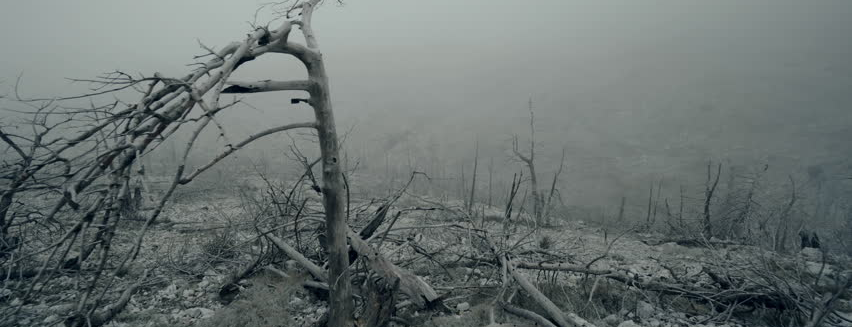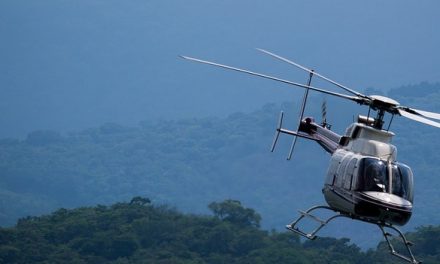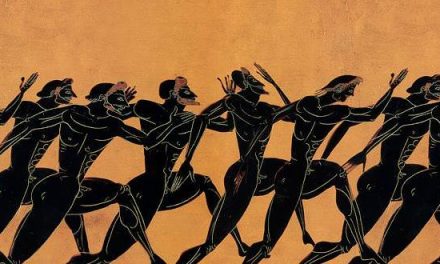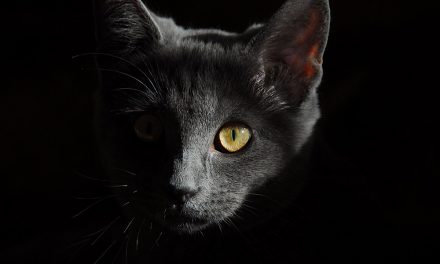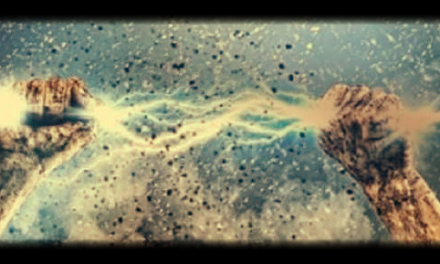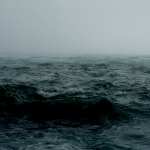Spending time inside the makeshift prison cell didn’t bother me – after all, it was quiet, comfortable, and had some nice art on the walls – but waking up to find myself inside it always did. Bolting upright with the slow realization that I must have lost my mind again, necessitating the other colonists to subdue me and lock me up for my own safety and theirs. I wasn’t a bad person, we all agreed on that, but sometimes the stress of trying to forge a life on a new, often inhospitable world took its toll on me. One moment I’ll be sharing pemmican with the others – nutritious if not particularly tasty – and the next I’ll find myself in the small prison that I helped them build for me. Whether it was a bad joke that set me off, or someone bumping into me, I always hear after the fact about what happened, because the last thing I always remember is the world going red and my fists balling up.
Ours was a small colony, made from refugees who survived the destruction of our spaceship. Escape pods had kept us safe as we fell to the unnamed world, and luckily enough cargo containers landed with us that we could survive the first winter. We had been users of technology, not designers of it, so there had been a lot of trial-and-error when it came to simple tasks like trying to frame up wooden shelters, pour concrete, or capture rainwater. Using batteries to store energy was an easy task, but actually trying to create batteries from base materials was a different undertaking altogether. Eventually we figured out ways to make it work, but brownouts were still common, and we had to power everything off during the rains, just in case.
The cell we had made – of course I contributed – consisted of mortared concrete blocks on a smoothed stone floor, a very sturdy wooden door locked on the outside, and a charitably-comfortable bedroll we had scrounged from the cargo stores. Marcella, our resident painter, had taken the opportunity to decorate the walls with paintings of her home city, which I appreciated – art may not have the most use in a survival sense, but it sure calmed the mind and helped center my thoughts. It took a few days after a mental break to really get me back down to base-line, where I wouldn’t fly off the handle again at the slightest – and usually unintentional – provocation. We also used the cell to hold wild animals we were attempting to tame, and the occasional raider who threatened our small community, before returning them back into the wilds from whence they came when they calmed down, but most often it stood empty.
My most recent stay in “La Maison Grise” as Patty, our youngest and most widely-traveled member, called it was continuing apace, two days of what was generally expected to be a three-day oubliette. My friends regularly brought in food and water, and made sure to keep me up to date with the goings-on of our small community. Someone had found a boulder made of compacted iron, which would be a great boon as we tried to expand our fledgling electrical grid, and all of the colonists – aside from me – would be heading out in the morning to mine it. I wished them very well, and looked forward to being able to contribute to the endeavor myself.
Though the holding room didn’t have windows – we were far from perfecting the art of glass-making – the air was cold and damp as I woke up, and I could almost make out the sound of rain falling on the distant mountains. It was going to be a soggy day, and my heart went out to my friends who would spend their time laboring in the drizzle. Clad in a thick leather parka and sturdy hat, Clovis brought me enough rations to see me through the day, in case they were out late. I thanked him and wished him well; I knew everyone’s mood would sour in the rain, but hopefully the promise of a hot meal that evening and a good night’s rest after a productive day of labor would keep them going. Sometimes, we really have to hold on to the little things – every day in our new home brought new dangers but also new opportunities, and keeping the right perspective was essential to all of our well-being.
The distant rains finally came to our camp, and I could hear its constant thrumming against the roof – a relaxing and welcome sound. I lay down on the bedroll and closed my eyes, remembering the sound of rain against the fields outside my family farm. I don’t know whether or not I fell asleep listening to that gentle cascade, but a very different noise shot me up out of bed, ears straining to hear more. Something nearby had exploded, the concussion ringing through the compound. Had the roof leaked onto our primitive battery system, or some of our makeshift insulation failed? Was it electrical at all? Beneath the constant and rhythmic beating of water against the eaves, the sound of crackling, burning wood reached me.
Most of our buildings, almost all of them save the jail, were made out of wood – trees were a far more abundant commodity than cement. Firefighting then became everyone’s responsibility, particularly when vicious dry thunderstorms rained lightning down on the valley where we established our home. Everyone knew where the buckets were kept, how to form a brigade, and where the best sources of water were; the whole community came together to quench any errant flames that escaped our oven or the feeble heaters which kept us warm through winter. The community would have come together to fight this latest blaze, had they not each of them been working on the large iron slab in the next valley.
For almost an hour – or so I guessed, without being able to see the sun – I paced in the small room, hearing the blaze feed and grow on our hard-won possessions. Smaller explosions told of our chemfuel reserves lighting off, scattering burning napalm in all directions. I beat my fists against the unrelenting door without effect, powerless to stop the fires consuming everything protected from the rain by our sturdy roofs.
Finally a ray of hope – the sounds of my fellow villagers returning to the town in haste, buckets and heavy rugs in hand! They must have seen the smoke from where they were working, and rushed back as quickly as possible, through miles of rain-soaked rolling fields. The voices were indistinct against the backdrop of the strengthening storm and violent flames, but it sounded like they were following the carefully-drawn plans for saving our town. Food stores would be tended to first, then animals, tools, and finally bedrooms. For a while it seemed like all was saved.
Then their cries turned from fighting the fires to saving each other – buildings had become wood-fire ovens and the original strategy of “divide and conquer” meant rescue was far away when the heat or smoke overwhelmed someone. Only too late did the healthiest among us figure out that the others had fallen. Soon the camp was silent aside from the pulsing wind, beating rain, and angry flames lapping at the few remaining supports. Huddled in the dark cell, I heard building after building crumble and fall. In my baleful impotence I saw red again.
It was night time when I came to, that I knew. The rains had passed, and the regular sound of frogs, cicadas, and other critters could be heard from outside. The prison was pitch black, with no ambient light creeping in under the door. I tasted blood in my mouth and my hands shook, fingers straining to obey my commands. Several felt broken. With nowhere else to vent my rage, I must have taken it out against the unforgiving concrete blocks which surround me. In the dark and the cold, I waited.
Hunger has destructive but predictable effects on the body; there’s weariness, agitation, cognitive decline, and body shakes as muscles are burned to keep the brain alive. Just as destructive but less predictable are the effects on the mind. More than once I swear I heard my friends and fellow colonists, just outside the door, jeering at me. I smelled chocolate fudge, though none had landed with us from the ship. I heard music, the kind Roger made with a blade of grass between his thumbs while we relaxed, playing horseshoes. For a moment I thought I even heard myself outside, lamenting my sorry state.
Eventually, and there’s no way for me to tell just how long it took, I was too weak to lift my body from the bedroll. My rations had long before run out, even conserving them as much as I could. The rains had some again and a small puddle had formed under the door, enough for me to lap at before the sun evaporated it away. I was dying, alone and forgotten on an alien world, the bodies of my friends and companions burned in the ruins of their homes. I felt like I was passing out, and some small part of me was grateful for the release.
Blinding pain brought me to consciousness, gasping and coughing with labored breath. A gap-toothed raider stood over me, a bloody knife in hand. “Still got some fight in ya?” he grinned with demented glee, his blood-stained cowboy hat held at a jaunty angle on his too-wide head. “They always taste better when they’re fighting.”
Once again, I saw red.
Panting from exhaustion and the multiple stab wounds I had received in my apparent scuffle with the raider, I stood over his dead body, knife in my hand. “It was either me or him,” I told myself, utterly lacking any genuine confidence. My shirt was tacky with blood and I painfully fell to my knees. The raider had opened my door, doubtlessly hoping to find treasure inside. “Instead you found me,” I spat at the glassy-eyed corpse. I crawled forward, feeling the soft warmth of the setting sun brush across my face, granting me one brief look at the remains of my fallen colony.
Nothing remained, nothing aside from my robust little prison. The rains had saved the rest of the valley, but the fires had taken our buildings, our belongings, our homes, and our lives.
The rush of adrenaline from the fight starting to wear off, I collapsed heavily onto my shoulder, laying prone on the cold, stone floor. I wouldn’t be able to make it to the ruins of the storehouse, where if by some miracle the flames had spared a medkit, and my vision began to gray around the edges. I was falling into unconsciousness again, and I knew this time, it would be for good. Gritting my teeth, defending myself against the raider restored some measure of my will to live – the planet may have conquered our settlement, but it wouldn’t conquer me.
Closing my eyes, I tried to steel myself for what would come next. There was only one source of food available, and in any other condition the thought would be more than abhorrent. Like I said, hunger makes the mind do strange things, and it’s hard to say what any of us wouldn’t do to ensure our survival. Slowly, painfully, I brought the raider’s dirty forearm to my mouth.
I wasn’t going to die here.
This story was wholly developed from the emergent gameplay of RimWorld, in a round played by John W and retold to me. Permission was given to create the above narrative from his fateful tale of the lost colony. Honestly, the game is rife with fantastic and terrible tales of survival and the lack thereof, and I heartily encourage anyone who enjoys survival/strategy/base-building games (Minecraft, Dwarf Fortress, Stardew Valley, Terraria) to give it a go. I sincerely hope I’ll be able to pen more tales from this fantastic game soon.

